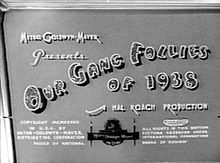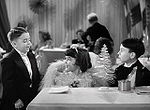- Our Gang Follies of 1938
-
Our Gang Follies of 1938 
Directed by Gordon Douglas Produced by Hal Roach Written by Hal Law
Robert A. McGowan
Norman Blackburn
Charles Rogers[1]Starring Carl Switzer
George McFarland
Eugene Lee
Darla Hood
Billie Thomas
Henry BrandonMusic by Marvin Hatley
Gioacchino Rossini
Arthur Johnston
Sam CoslowCinematography Art Lloyd Editing by William H. Ziegler Distributed by Metro-Goldwyn-Mayer Release date(s) December 18, 1937 Running time 21' 16" Country United States Language English Budget $58,815[2] Our Gang Follies of 1938 (later reissued as simply Follies of 1938) is a 1937 American musical short subject, the 161st short subject entry in Hal Roach's Our Gang (Little Rascals) series. Directed by Gordon Douglas as a sequel to 1935's Our Gang Follies of 1936, the two-reel short was released to theaters on December 18, 1937 by Metro-Goldwyn-Mayer.
Deriving its title from the concurrent MGM feature film The Broadway Melody of 1938, Our Gang Follies of 1938 is a spoof of the Broadway Melody films and other movie musicals of the time. In the film, Alfalfa (Carl Switzer) decides to quits a pop music revue put on by Spanky (George McFarland) and become an opera singer, famously singing a pastiche song entitled "The Barber of Seville" several times throughout the film. The bulk of the film is made up of a dream sequence, in which Alfalfa imagines himself twenty years later failing as an opera singer, while Spanky owns a Broadway nightclub with a lavish floor show.
Contents
Plot
The gang is putting on another big show in Spanky's cellar, complete with an orchestra led by Buckwheat (Billie Thomas), and planned performances by Darla (Darla Hood) and many of the other neighborhood kids. However, "King of Crooners" Alfalfa (Carl Switzer), the intended star of the show, crashes the show full of swing music with his off-key rendition of "The Barber of Seville" , having secretly decided that he's only going to sing opera from now on. After Spanky closes the curtain on Alfalfa and sends out another act to replace him, the would-be opera prodigy walks out on the show, taking his voice "where it'll be appreciated!"
With Porky (Eugene Lee) as his right-hand man/hanger on, Alfalfa turns up at the Cosmopolitan Opera House, wanting to appear in their next opera. Barnaby (Henry Brandon), the impresario of the Cosmopolitan, jokingly offers the young boy a contract - provided he come back in twenty years. Elated, Alfalfa returns to Spanky's cellar with Porky, gloating about his presumed good fortune and illustrious future in the face of Spanky's pleas for Alfalfa to appease his customers and take the stage. Spanky tears into his best friend, telling him that "someday I'll be a big producer on Broadway, and you'll be singing your opera in the streets with a tin cup in your hand!" Alfalfa brushes off Spanky's warnings, and sits down to rest (the opera singer at the Cosmopolitan told him to make sure he gave his voice "plenty of rest" and "kept it quiet").
Alfalfa falls asleep backstage, and dreams that the twenty years have elapsed and he and Porky are waiting at the steps of a Broadway opera house. Barnaby, now a wizened old man, has decorated Broadway with lighted signs heralding Alfalfa's opera debut, and invites Alfalfa in to perform. However, when the opera house curtains finally open, Alfalfa barely gets through a few bars of "The Barber of Seville" before the audience members begin to boo him and pelt him with rotten vegetables. An angry Barnaby literally throws Alfalfa out into the streets. Bound by the iron-clad contract he signed twenty years ago, Alfalfa is forced to sing for pennies in the cold, snowy streets of New York. Hungry, tired, and broke, Alfalfa and Porky happen upon a shocking sight several blocks away: "Club Spanky", an ornate nightclub on Broadway. Sure enough, Spanky himself, now rich and famous, rides up in a limousine to greet them, and graciously invites them inside for something to eat.
Club Spanky is a child's dream fantasy of a New York nightclub, with decor derived from toy blocks and candy canes, and a menu which includes hamburgers, ice cream, and jellybeans. Darla, dressed in furs and diamonds, comes over to sit at Spanky's table. She tells Alfalfa that she performs at Club Spanky, and is now rich and making "hundreds and thousands of dollars." Alfalfa gets a second shock when he learns that Buckwheat (now "Cab Buckwheat") is still Spanky's bandleader, and is also rich, dripping with diamonds, and making "hundreds and thousands of dollars."
Spanky offers to let Alfalfa and Porky work for him again; Porky immediately accepts the offer, but the stubborn Alfalfa declares himself "a slave to my art" and refuses to "croon". Instead, Alfalfa sits and watches Club Spanky's lavish floor show, with featured songs by Spanky, Darla, Buckwheat, Porky, and several other performers, supported by large, ornate sets and scores of dancers. At the show's conclusion, Alfalfa finds himself so impressed with the show that he decides to go back to "crooning". Spanky announces the return of the "King of Crooners" to a rapturous crowd, but before Alfalfa can begin to sing, Barnaby storms into the club, and begins to drag Alfalfa back out into the streets to sing opera. By now, Alfalfa is complaining that he doesn't want to sing opera anymore, but Barnaby only laughs and continues to drag Alfalfa towards the door.
The Club Spanky patrons' cries of "we want Alfalfa" melt into those of the kids in Spanky's cellar. Alfalfa awakens to find Spanky, not Barnaby, tugging at his arm, begging for Alfalfa to at least join in the last act and croon for the kids. Alfalfa needs no further convincing, and rushes onstage with Spanky, Porky, Darla, and the other kids to sing Bing Crosby's "Learn to Croon" for the show's finale.
Cast
- Main Our Gang cast
- Carl "Alfalfa" Switzer
- George "Spanky" McFarland
- Eugene "Porky" Lee
- Darla Hood
- Billie "Buckwheat" Thomas
- Featured Our Gang performers
- Annabelle Logan
- Georgia Jean LaRue
- Philip MacMahon
- Our Gang bit players and dancers
Frances Bowling, Tom Braunger, Bill Cody, Jr., John Collum, Patsy Currier, Charles Flickinger, David Freeman, Betsy Gay, Joe "Corky" Geil, Bobbie Hickman, Philip Hurlic, Gloria Hurst, Dickie Jones, Darwood Kaye, Georgia Jean LaRue, Henry Lee, Ada Lynn, Philip MacMahon, Tommy McFarland, Billy Mindy, Raymond Rayhill Powell, June Preston, Josephine Roberts, Jimmy Sommerville, Harold Switzer, Bobs Watson, Kenneth Wilson, Robert Winkler, Gloria Browne, Bobby Crockett, Tim Davis, Billy Diamond, Dorothy Heinrichs, Paul Hilton, Dorothy Horner, Don Hulbert, Patsy May, Roger McGee, Norman Salling, Clifford Severn, Nora Rita Stein, Helen Westcott, Camille Williams, Laura June Williams, and Rhoda Williams
- Adults
- Henry Brandon: "Barnaby", opera impresario
- Gino Corrado: Opera singer
- Wilma Cox - Miss Jones, Barnaby's secretary
- Doodles Weaver - Piano player
Production
Often pointed out as one of the best entries in the series[3], Follies of 1938 was produced as a special one-shot return to the series' original two-reel (twenty minute) format, after a season and a half of shorter one-reel films. In addition, Follies of 1938, particularly its extended dream sequence, features lavish production design and filmmaking typical of feature length MGM musicals.[4] MGM in fact helped finance the short beyond its usual contributions to the Roach shorts; as a result its opening titles read "Metro-Goldwyn-Mayer presents Our Gang Follies of 1938, A Hal Roach Production," as opposed to the usual "Hal Roach Presents Our Gang in..."[4] At a negative cost of $58 thousand[2], Follies of 1938 was the most expensive Our Gang short ever produced.[2]
The short's cast includes over one hundred children, as nearly all of the parts in the film (even the "adults" in Alfalfa's dream sequence) are played by kids. The lone exceptions are Henry Brandon's "Barnaby" character (not named onscreen, but named as such in the script),[4] and the other three adults seen at the Cosmopolitan Opera House. Brandon's villainous Barnaby character was re-purposed from another Hal Roach production, Laurel and Hardy's 1934 feature Babes in Toyland.[4] One of the featured singers in Spanky's cellar show is Annabelle Logan, a girl who sings a swing rendition of the traditional Scottish song "The Bonnie Banks o' Loch Lomond". Logan would grow up to become Annie Ross, a successful jazz singer and actress.[5]
Notes
Our Gang Follies of 1938 is one of four sound Our Gang shorts that fell into the public domain after the copyright lapsed in the 1960s (the other three being School's Out, Bear Shooters and Waldo's Last Stand). As such, these films frequently appear on inexpensive video and/or DVD compilations.
Songs
Songwriters[1] are listed in italics.
- "Stagecoach Conversation" (Marvin Hatley) - Buckwheat and His Orchestra (instrumental)
- "Follies Introduction/King Alfalfa" (Hatley) - Spanky , Darla, and "Follies" chorus girls
- "The Barber of Seville" (Gioacchino Rossini) - Alfalfa
- "Pick a Star" (R. Alex. Anderson) - Harmonica Players (Henry Lee and Harold Switzer)
- "The Barber of Seville" (Reprise #1) -Gino Corrado and Alfalfa
- "Loch Lomond" - Annabella Logan
- "Honolulu Baby" (Hatley) - Buckwheat and his Band (instrumental)
- "The Barber of Seville" (Reprise #2) - Alfalfa
- "Follow the Leader" (Arthur Morton) - "Cab Buckwheat" and His Orchestra
- "The Love Bug Will Get You (If You Don't Watch Out)" (Pinky Tomlin) - Darla, Spanky, Porky, Buckwheat and Georgia Jean LaRue
- "That Foolish Feeling" (Harold Adamson, Jimmy McHugh) - Georgia Jean LaRue
- "There's No Two Ways About It)" (Harold Adamson, Jimmy McHugh) - Philip MacMahon and Ensemble
- "Learn to Croon" (Arthur Johnston, Sam Coslow) - Alfalfa
- "Follies Conclusion" (Hatley) - Alfalfa, Spanky, Darla, Porky, Harold Switzer, Henry Lee, Gloria Browne, Gloria Hurst, and Laura June Williams
See also
References
- ^ a b Demoss, Robert (9 November 2008). "The Lucky Corner: Our Gang Follies of 1938". http://theluckycorner.com/rmt/162.html. Retrieved 19 November 2008..
- ^ a b c Maltin, Leonard and Bann, Richard W. (1977, rev. 1992). The Little Rascals: The Life and Times of Our Gang, p. 238. New York: Crown Publishing/Three Rivers Press. ISBN 0-517-58325-9
- ^ Erickson, Hal (2007). "Review of Our Gang Follies of 1938". Allmovie. Retrieved January 24, 2007.
- ^ a b c d Maltin and Bann. (1977, rev. 1992). p. 187-189.
- ^ Maltin and Bann. (1977, rev. 1992). p. 278.
External links
- Our Gang Follies of 1938 at the Internet Movie Database
- Our Gang Follies of 1938 at AllRovi
- The short film Our Gang Follies of 1938 is available for free download at the Internet Archive [more]
Categories:- 1937 films
- American films
- English-language films
- 1930s musical comedy films
- American musical comedy films
- Black-and-white films
- Films directed by Gordon Douglas
- Metro-Goldwyn-Mayer short films
- Our Gang films
Wikimedia Foundation. 2010.

